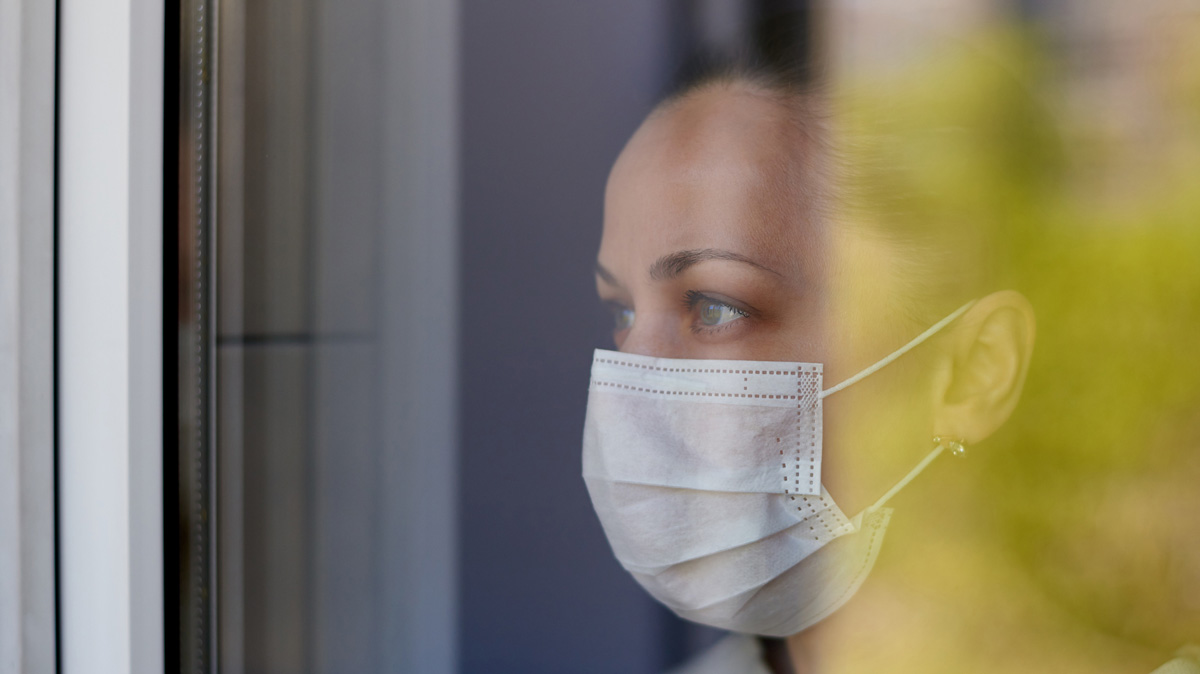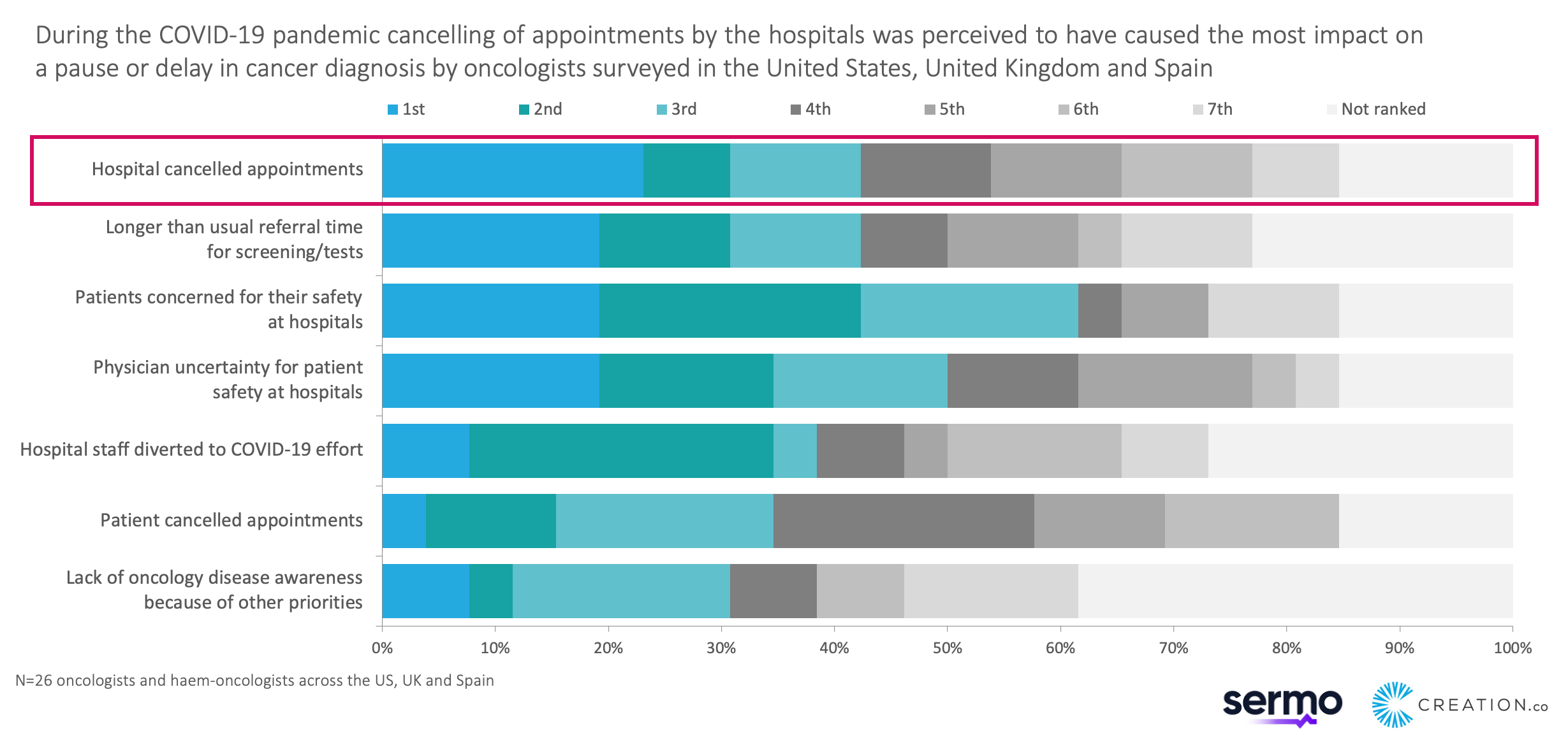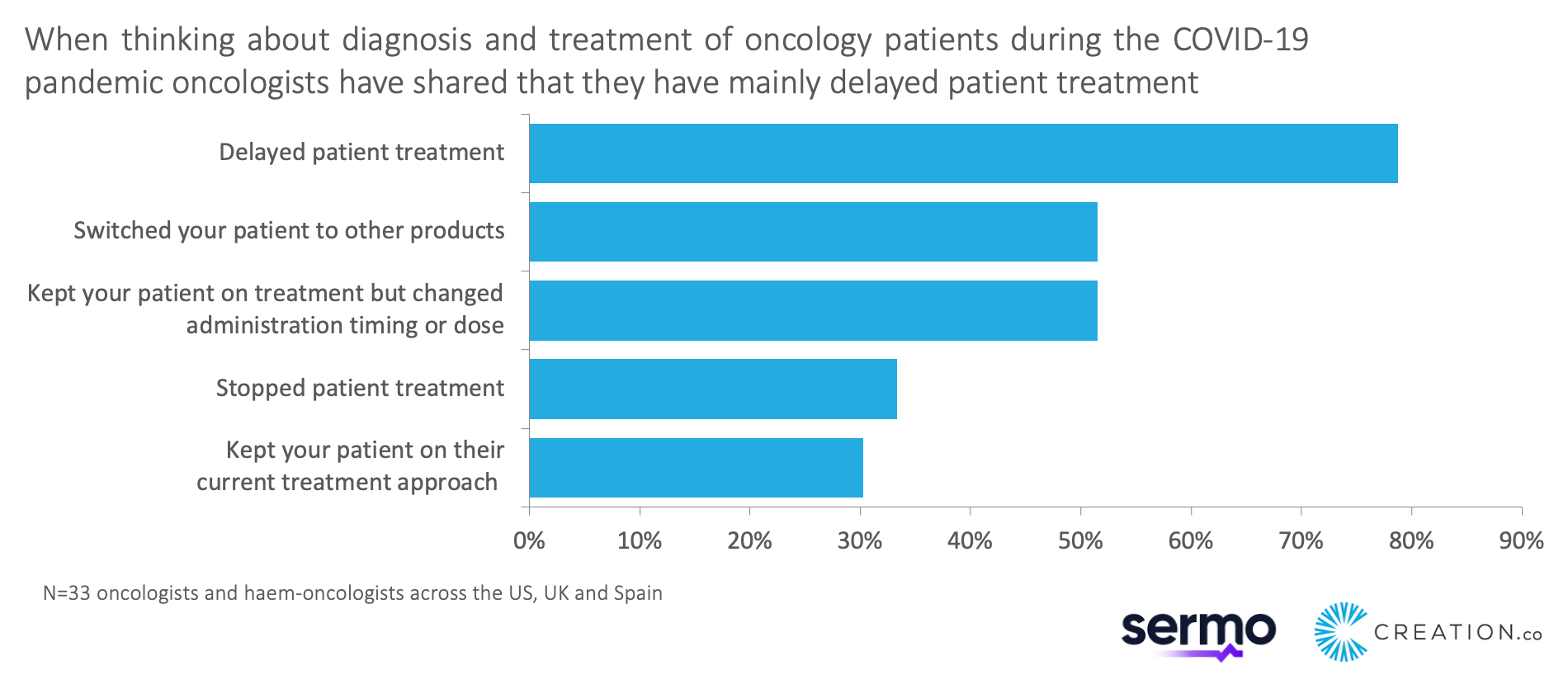What HCPs think about COVID-19’s impact on cancer

COVID-19’s knock-on effect on cancer patients is of concern by HCPs, with delayed or decreased diagnosis seen as a key worry. CREATION.co’s Lara Meyer explores why HCPs need more support.
The COVID-19 pandemic has been mainstream headline news throughout 2020 and continues to have a profound impact on all our lives. A key concern that has emerged from the crisis is how COVID-19 will affect other areas of healthcare, particularly cancer diagnosis and treatment.
To understand what healthcare professionals (HCPs) felt about this topic, CREATION.co investigated public social media, in collaboration with Sermo’s HCP survey platform, Sermo RealTime, which provides real time access to physician insights.
We looked at conversations that HCPs were having online to provide a full picture of their concerns and needs. By designing fast surveys based on insights from the online conversation we were able to get a powerful depth of insight. For the survey we recruited oncologists from the United States, United Kingdom and Spain.
HCPs concern for decreased cancer diagnosis
During the COVID-19 pandemic, delayed or decreased cancer diagnosis was highlighted by HCPs as a key concern. Prominent industry figures, such as oncologist and ex-director of the WHO Cancer Programme Professor Karol Sikora, shared news articles and utilised their networks to raise awareness of decreased cancer diagnosis.
https://twitter.com/ProfKarolSikora/status/1253003690816012289
However, only a fraction of HCPs explained why they experienced a decrease. Knowing the “why” can help to address the specific challenges that hospitals are facing to ensure patients are receiving the care they need.
Using Sermo RealTime, we asked physicians to rank why they believe there has been a decrease in diagnosis at their hospital or practice. We discovered that cancellation of appointments by hospitals was perceived to have caused the most impact. The reason ranked as the next factor, was hospital staff being diverted to COVID-19 efforts. Understanding these reasons could help with resource allocation and impact assessments.

On social media, HCPs chose to encourage their peers to continue supporting their oncology patients during the pandemic. Again, key online influencers, such as Dr Tatiana Prowell - a well-known medical oncologist specialising in breast cancer, led a call to prioritise patients and raise awareness of decreased diagnoses. We have seen many HCPs supporting their peers online throughout the pandemic.
https://twitter.com/tmprowell/status/1259995807492771841
Uncertainty around cancer treatment
A significant part of the HCP conversation online discussed treatment of oncology patients. Physicians shared their concerns about delaying or changing treatment approaches and the impact this would have in the long term. When surveying physicians using Sermo RealTime, 79% of HCPs shared that they had delayed their patients’ treatment, while 52% of HCPs opted to change their patients’ treatment approach either by switching the drug their patient is on, or changing the administration timing or dose.
For the pharmaceutical industry, this knowledge could help teams in their communication plans to support HCPs with updated information or guidelines about treatments.

We regularly see HCPs share treatment guidelines on social media to provide support when there is confusion around new or existing treatment approaches, often creating their own guidelines when none exist.
https://twitter.com/ABhealer108/status/1238641293326200832
And in our survey of physicians, 58% of respondents shared that regulatory guidelines have been their go-to source for information and advice for treatment during the COVID-19 pandemic, alongside consulting their peers. However, even HCPs’ go-to source did not always provide as much support as they would have liked, with some HCPs sharing that they are still unsure of the correct treatment for patients during the COVID-19 pandemic or for cancer patients that have COVID-19.
https://twitter.com/Latinamd/status/1244024125921820672
After surveying HCPs about how confident they were about the information and advice they have received about continuing treatment for their COVID-19 positive or negative cancer patients, 70% of physicians shared that they were “somewhat confident but consulted with their peers”, showing how important peer support is during this time.
HCPs look to the future
As COVID-19 continues to affect countries around the world, HCPs are concerned about the short-term and long-term implications the pandemic will have on patient diagnosis and care. Despite having to respond reactively day-to-day, and the focus on the here and now, the future is still on HCPs’ minds.
Dr Stephanie Graff, a breast cancer oncologist, shared her concerns about “what this might mean long term—stage at diagnosis for example”, and how to bring patients safely back to care.
https://twitter.com/DrSGraff/status/1258517145891168261
When physicians in our survey were asked what some of the key concerns are for them going forward, they shared the backlog of patient cases that will need manual review and further investigations, switching to less effective or immunosuppressive treatments, and patients’ hesitancy or distress preventing them getting treatment. Others also shared the same concern as Dr Graff, that cancer patients present at a later stage because of backlogs and hesitancy to come to hospitals having a much larger impact on the treatment approach for these patients.
Across both open and closed online networks HCPs are concerned about the future of patient care.
https://twitter.com/marinagarassino/status/1256309521577730051
The online HCP conversation continues at a steady rate each day with oncologists, nurses and specialists continuing to share their concerns and needs online with peers. Throughout the year, HCPs continue to seek the answers they are looking for and share resources online.
https://twitter.com/Jessica_Bate/status/1323915624259735553
These concerns all present opportunities for pharmaceutical companies, hospitals, advocacy groups and medical organisations to support HCPs in very specific areas. Listening to the voices of HCPs online, especially as they are more active during this time, can help uncover key areas for engagement and support.
About the author
 At CREATION.co, Lara supports clients in scoping and delivering projects. Her pharmaceutical experience includes laboratory research, as well as in marketing and strategy and she recently completed an MSc in Global Management from the London School of Economics. Working with CREATION.co she leads a team of insight analysts compiling reports.
At CREATION.co, Lara supports clients in scoping and delivering projects. Her pharmaceutical experience includes laboratory research, as well as in marketing and strategy and she recently completed an MSc in Global Management from the London School of Economics. Working with CREATION.co she leads a team of insight analysts compiling reports.












